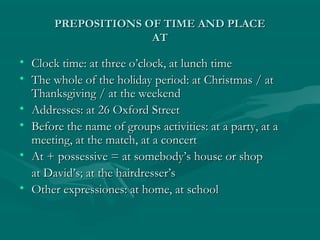Prepositions of time and place
- 1. PREPOSITIONS OF TIME AND PLACE IN ?Parts of the day: in the morning/afternoon/evening ?Months: in April ?Years: in 2010 ?Centuries: in the 15th century ?Seasons: in Spring / Summer Ą ?Cities: in London ?Countries: in Spain ?Name of streets: in Oxford Street ?Other expressions: in hospital /prison / bed in the north / south of Spain
- 2. PREPOSITIONS OF TIME AND PLACE ON ? Days of the week: on Sundays ? Parts of a particular day: on Monday morning / on a cold afternoon ? Dates: on 3rd July ? One day of the holidays: on Christmas Day / on Easter Friday ? Numbers of floors: She lives in a flat on the 2nd floor.
- 3. PREPOSITIONS OF TIME AND PLACE AT ? Clock time: at three oĄŻclock, at lunch time ? The whole of the holiday period: at Christmas / at Thanksgiving / at the weekend ? Addresses: at 26 Oxford Street ? Before the name of groups activities: at a party, at a meeting, at the match, at a concert ? At + possessive = at somebodyĄŻs house or shop at DavidĄŻs; at the hairdresserĄŻs ? Other expressiones: at home, at school
- 4. NOTE THE DIFFERENCE ? AT NIGHT (during any night): I often work at night. ? IN THE NIGHT (during one particular night): I had to get up in the night.




